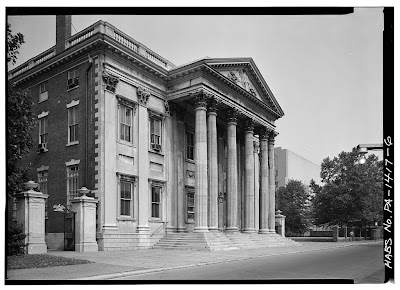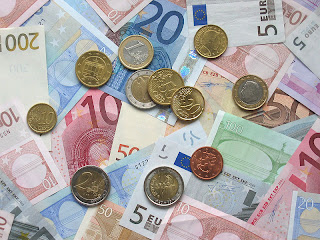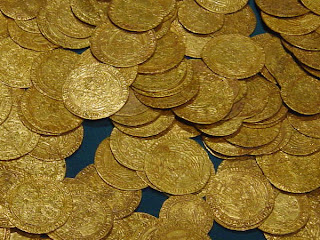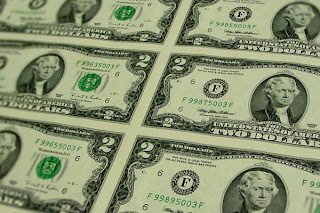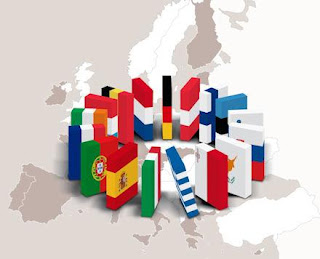Showing posts with label currency. Show all posts
Showing posts with label currency. Show all posts
Sunday, July 7, 2013
The Dollar Death Spiral
The creation of the Federal Reserve Bank was authorized by the United States Congress by a narrow majority vote just before congress went on break for the Christmas holiday in 1913. Its existence was born out of manipulations from the banking elite of the time. The directive for the newly formed Federal Reserve was limited, however as time passed, this budding banking institution became a central planners dream for all things monetary.
The ownership of physical gold was banned in 1933 by President Theodore Roosevelt. Eleven years later at the end of WWII allied powers were finally victorious in the creation of an international monetary treaty in Bretton Woods New Hampshire. In 1944, the Bretton Woods Agreement was born where it was agreed upon to use the dollar as if it were gold by backing the dollar with real gold at 10% using a pegged value of $35.00 per ounce...
Saturday, June 29, 2013
Historical Beginnings Of Currency And The Modern Banking System
What is Money?
Historically many things throughout time have been used as money. Which include beads, shells, stones, tobacco, wheat, livestock, gold, silver and currency. But what makes money? Not everything is money, some is currency.
What is Currency?
It is a unit of monetary exchange that can be used in trade for all goods and services. It is made up of the following important key elements. It acts as a circulating medium of exchange – which is an intermediary used in trade to avoid the inconvenience of a peer barter system. It’s a unit of account – which is a standard monetary unit of measurement of value and costs on all goods, services and assets…
Labels:
banking system,
coins,
currency,
gold coins,
goldsmith,
merchant banker,
monetary exchange
|
0
comments
Saturday, June 1, 2013
The Path of Gold – Where it’s Been, Where it’s Headed!
All of the gold held by central banks throughout the west, originally, was owned by the people. Slowly this gold has been siphoned away from the people by the central bankers through inflation. However now, even these giant banks in the west are losing their gold as it slowly is being transferred to the east.
The gold stored in these central banks was at one time used to back all western currencies. However the sole purpose for gold being held in western banks today is for repayment of debt. History shows us that approximately every 30 to 40 years the world creates a new monetary system. Previous monetary systems continually have failed due to poor fiscal policy, planning and manipulations. Before WWI most countries kept a specific amount of gold in their treasuries. The treasuries would then issue out currency notes into circulation in amounts that equaled the equivalent value of…
Friday, March 15, 2013
What Is The Difference Between Currency And True Money?
 Currency has been around in various paper forms throughout societies for generations. People use it every day. But how many people really know what the difference is between paper currency and money?
Currency has been around in various paper forms throughout societies for generations. People use it every day. But how many people really know what the difference is between paper currency and money?Currency has been defined as a circulating medium of exchange, used as an intermediary in trade to avoid the use of a barter system. The benefits and usefulness of currencies include; being a unit of account, or standard measurement of value. Other key factors include; durability, divisibility, ease of transportation and being …
Saturday, September 29, 2012
Could There Be A Chance For A One World Currency?
Would the world be a better place if it were able to share the same currency? Would it benefit the masses? Honestly, that answer has to be no. The chances of the entire world using the same currency will never have a chance to exist, let’s understand why.
The utmost important factor in argument against sharing a world-wide common monetary unit regardless what that monetary unit might be called, hinges upon one common and certain fact. The loss of each country’s ability to wage war. To begin, all countries would have to be losing their economies at the same time. And from this point forward if a common currency were put into place, each country would lose the ability to create war upon another nation…
The utmost important factor in argument against sharing a world-wide common monetary unit regardless what that monetary unit might be called, hinges upon one common and certain fact. The loss of each country’s ability to wage war. To begin, all countries would have to be losing their economies at the same time. And from this point forward if a common currency were put into place, each country would lose the ability to create war upon another nation…
Sunday, September 16, 2012
Sound Money - Can Change Governments
Sound money should be the only acceptable means of payment or credit used during these insane times when all major countries are fighting to survive with “record setting” government debts. Governments must all revert back to a sound money system to regain fiscal control over their spending habits or face losing everything.
Money – The Beginning
In the distant past, man used bartering and trading as acceptable forms of payment for goods and services. Many items traded included sea shells, salt, tobacco, herd animals, beaded belts, gem stones and gold. This worked well at the time, however there needed to be a better more convenient way to make transactions.
Coins became the first answer to make the exchange of goods and services more convenient. In 600 B.C. the first minted coins appeared, they were minted from an alloy called electrum. This was a combination of gold and silver. Each coin had a specific weight of 4.7 grams and acted as a medium of exchange, division of payment and was also capable of maintaining its value. From the time coins were first minted they gained popularity becoming the best form of money all the way into modern times.
What is Sound Money
In 400 B.C. Aristotle defined what sound money was and what characteristics were necessary to insure sound money. He said that sound money must incorporate all 7 of the following properties…
Money – The Beginning
In the distant past, man used bartering and trading as acceptable forms of payment for goods and services. Many items traded included sea shells, salt, tobacco, herd animals, beaded belts, gem stones and gold. This worked well at the time, however there needed to be a better more convenient way to make transactions.
Coins became the first answer to make the exchange of goods and services more convenient. In 600 B.C. the first minted coins appeared, they were minted from an alloy called electrum. This was a combination of gold and silver. Each coin had a specific weight of 4.7 grams and acted as a medium of exchange, division of payment and was also capable of maintaining its value. From the time coins were first minted they gained popularity becoming the best form of money all the way into modern times.
What is Sound Money
In 400 B.C. Aristotle defined what sound money was and what characteristics were necessary to insure sound money. He said that sound money must incorporate all 7 of the following properties…
Sunday, August 26, 2012
History of Money - The Missing Subject, You Never Learned in School
Like many others, I was educated in the US public school system. It seems however, one very important subject had never purposely been taught in our schools. That subject being the history of money and attainment of wealth.
The biggest reason public educators never approached this subject was that monetary history was taught privately and only to the elite one percent of the world’s society. Meaning only the ultra rich were privy to this closely guarded information. The other 99% of us were basically “shit out of luck”. Monetary history and wealth generation were spoon fed to the elite one percent. Once they entered society they used this valuable information strictly to their advantage, allowing them to earn 90% of the total wealth generated on the planet…
The biggest reason public educators never approached this subject was that monetary history was taught privately and only to the elite one percent of the world’s society. Meaning only the ultra rich were privy to this closely guarded information. The other 99% of us were basically “shit out of luck”. Monetary history and wealth generation were spoon fed to the elite one percent. Once they entered society they used this valuable information strictly to their advantage, allowing them to earn 90% of the total wealth generated on the planet…
Saturday, July 7, 2012
Inflation and the Dollar Crisis
The rate of inflation in the United States has been steadily rising. The inflationary rate is a major, if not the key fundamental factor in determining the actual value of your money. The actual net worth of your dollars can be translated into how much purchasing power your dollars have for buying various goods and services over time.
The rate of inflation in the United States has been steadily rising. The inflationary rate is a major, if not the key fundamental factor in determining the actual value of your money. The actual net worth of your dollars can be translated into how much purchasing power your dollars have for buying various goods and services over time....
The rate of inflation in the United States has been steadily rising. The inflationary rate is a major, if not the key fundamental factor in determining the actual value of your money. The actual net worth of your dollars can be translated into how much purchasing power your dollars have for buying various goods and services over time....
Labels:
crisis,
currency,
dollar,
gold,
hard money,
inflation,
money,
money supply,
silver,
silver coin,
true value,
united states,
us dollar,
us dollar crisis
|
0
comments
Saturday, June 16, 2012
The History Of Money
 In the earliest of times trading and bartering were used in the exchange of goods and services. The trading of such items as herd animals, sea shells, salt, tobacco, gold, gemstones and other similar items were commonly used by man before actual currency was invented.
In the earliest of times trading and bartering were used in the exchange of goods and services. The trading of such items as herd animals, sea shells, salt, tobacco, gold, gemstones and other similar items were commonly used by man before actual currency was invented.Currency – The Beginning
The first currency ever used, was in coin form and dates back to 600 B.C. by then King Croesus of Lydia in Asia Minor. At that time Lydia was located in what is now present day Turkey. These coins were minted from a naturally occurring alloy of gold and silver called electrum. And each coin had a specific weight of 4.7 grams. These coins functioned as a medium of exchange, unit of payment and were capable of preserving value...
Sunday, April 29, 2012
Euro Zone Crisis – Will It Destroy The US Dollar?
The economic conditions in Europe are becoming worse as the weeks move on. In all, there’s at least a fifty percent stake involving US banks that are exposed to some degree with European debt problems within the Euro-zone. Furthermore, it is the US dollar that still remains the world’s reserve currency. And the Federal Reserve, whose status remains none other than the “lender of last resort” thus, making it very hazardous for the US taxpayers.
The huge US Government bailout program from 2008 only helped the large banks, auto industry and giant institutions such as AIG and several foreign central banks from going under. Because they were all deemed “to big to fail” at the end of the day however, nothing was solved and the bailouts amounted to nothing. These mega banks and companies only lined their own greedy corporate pockets and left the American taxpayers holding the bag...
The huge US Government bailout program from 2008 only helped the large banks, auto industry and giant institutions such as AIG and several foreign central banks from going under. Because they were all deemed “to big to fail” at the end of the day however, nothing was solved and the bailouts amounted to nothing. These mega banks and companies only lined their own greedy corporate pockets and left the American taxpayers holding the bag...
Saturday, March 24, 2012
Inflation and the Economic Crisis
If you happen to be an American reading this article then I assure you that you’re in the midst of the greatest financial paradigm shift in modern history. Furthermore you have a front row seat to this epic event. Hopefully you are one of the few that have been following this event closely and paying attention to options still available to you for protecting yourself from rising inflation, and the ever approaching economic crisis.
Hopefully, you’re not in the category of non believers thinking the government will save you. Doing your best pretending the day of reckoning is never going to come upon your doorstep, regardless of all the evidence you might have heard or read about. Regardless what level of defiance you carry around with you history will always be on the side of the truth. There is no prejudice here that will enter the equation regardless of what you think you would be entitled to. If I am sounding a little pessimistic, then I am making my point. There is nothing that will keep this economic crisis from coming and there is too much hard evidence and monetary history surrounding this to look the other way...
Hopefully, you’re not in the category of non believers thinking the government will save you. Doing your best pretending the day of reckoning is never going to come upon your doorstep, regardless of all the evidence you might have heard or read about. Regardless what level of defiance you carry around with you history will always be on the side of the truth. There is no prejudice here that will enter the equation regardless of what you think you would be entitled to. If I am sounding a little pessimistic, then I am making my point. There is nothing that will keep this economic crisis from coming and there is too much hard evidence and monetary history surrounding this to look the other way...
Friday, March 9, 2012
Re-Examining - The Gold Standard
A sound monetary system is one in which a currency is backed by gold, at least a percentage or fixed weight of gold. This is different from the monetary system currently used in the United States and many other countries. Today, all national currencies are fiat currencies. Fiat currency is currency that has value only because of government regulation or law of which carries no intrinsic value of any kind.
At the time of the Great Depression, numerous countries went away from the gold standard since they had to pump money into their economies to stimulate growth. Having a gold standard would not allow them adequate economic flexibility. It is also true that there can actually be too much economic flexibility...
At the time of the Great Depression, numerous countries went away from the gold standard since they had to pump money into their economies to stimulate growth. Having a gold standard would not allow them adequate economic flexibility. It is also true that there can actually be too much economic flexibility...
Subscribe to:
Posts (Atom)
About Me
- Unknown
Join Our Newsletter
Subscribe to our Free Newsletter, fill out the form below. Watch for our weekly newsletter updates.
Our strict privacy policy keeps your email address 100% safe & secure.
Powered by Blogger.

